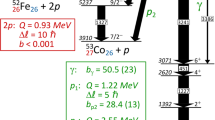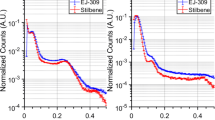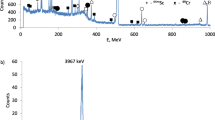Abstract
THE energy spectrum of positive electrons from magnesium, when bombarded by α-particles of radium CĆ reduced in range to 6.3 cm., were investigated by a method already described1. It was found that the number of positives is less than that expected from the measurements of the integral effect. Changing the direction of the magnetic field, a great number of negative electrons could be observed. The number of negative electrons was about four times as great as the number of positive electrons.
This is a preview of subscription content, access via your institution
Access options
Subscribe to this journal
Receive 51 print issues and online access
$199.00 per year
only $3.90 per issue
Buy this article
- Purchase on Springer Link
- Instant access to full article PDF
Prices may be subject to local taxes which are calculated during checkout
Similar content being viewed by others
References
Alichanow, NATURE, 133, 581, April 14, 1934.
Author information
Authors and Affiliations
Rights and permissions
About this article
Cite this article
ALICHANOW, A., ALICHANIAN, A. & DVHELEPOW, B. A New Type of Artificial β-Radioactivity. Nature 133, 871–872 (1934). https://doi.org/10.1038/133871b0
Issue Date:
DOI: https://doi.org/10.1038/133871b0
This article is cited by
-
Sulla Radioattività Provocata
Il Nuovo Cimento (1934)
Comments
By submitting a comment you agree to abide by our Terms and Community Guidelines. If you find something abusive or that does not comply with our terms or guidelines please flag it as inappropriate.



